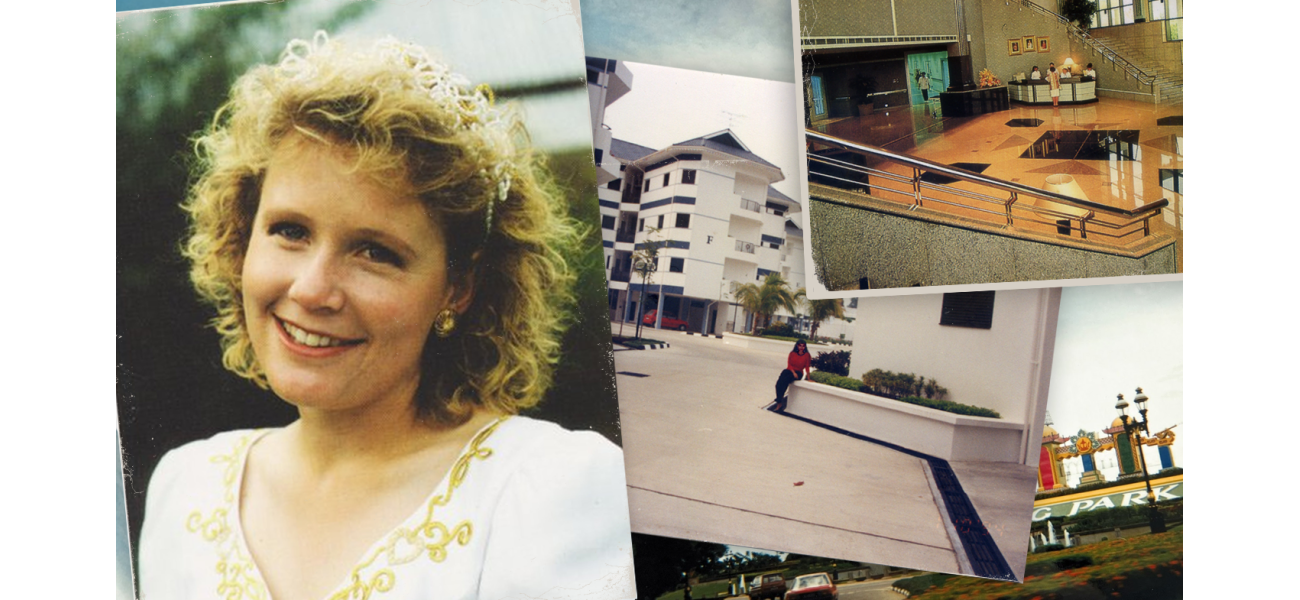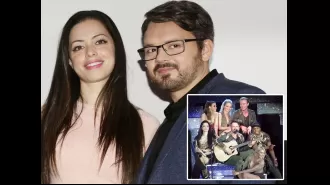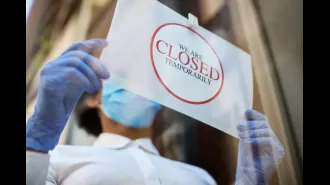A horrific nightmare come true: Murder on my doorstep.
Anthea's death remains a mystery 30 years later due to the unknown timing, location, and circumstances surrounding it.
September 20th 2024.

Watching murders on television is one thing, but experiencing it in real life, right at your doorstep, in the place you thought was the safest in the world, is a whole other level of terrifying. It's something that can only be truly understood by going through it firsthand, as I did on that fateful day of July 21, 1994. It was the day that young Anthea Bradshaw-Hall was brutally murdered in Brunei, far away from her family in Adelaide. The thought of it still sends shivers down my spine, even after 30 years.
The circumstances surrounding Anthea's death were incredibly unusual and left everyone, including myself, with more questions than answers. That's why when I heard about Channel 9 reporter Ben Avery's podcast investigation on Anthea's murder, I was relieved to know that the case was being brought back into the spotlight. I could sense Ben's genuine commitment to uncovering the truth, and I was more than happy to assist in any way I could.
My conversations with Ben brought back a flood of memories, and I found myself reliving that day over and over again, trying to remember every little detail that could help with the investigation. In fact, I even started jotting down my recollections, which eventually led to this piece of writing. To truly grasp the uniqueness of Anthea's case, one must first understand a bit about Brunei – its culture and the exclusive medical facility where I and Jeff Hall worked.
I was offered a job at the Jerudong Park Sports Medicine Centre in Brunei while I was living in Singapore. At the time, I was young and had no idea what to expect, but it seemed like an exciting opportunity. The Bruneians were accustomed to having foreigners in their midst, as the country had a significant expatriate population of around one-third of its total population of 300,000 during my time there. Looking back, I can only describe the locals as friendly and peace-loving people who embraced their beliefs in a quiet, non-threatening manner. Violence and serious crimes were out of place in Brunei, a country often referred to as "the abode of peace."
Jerudong Park was a unique and special area, different from the rest of the city. It was always bustling and lit up, thanks to the magnificent Crystal Arch fountain – a landmark structure with its gold mosaic tiled columns topped with a large replica diamond. I had heard that it symbolized the ring given by the Sultan of Brunei to his first wife. The arch was situated within a roundabout that I passed through every day on my way to work. I lived in Jerudong Park, in a private apartment complex exclusively for staff. The complex had three levels with four apartments on each floor, all identical in their setup and furnishings. I resided on the second floor, and although it was a comfortable living arrangement, I was a bit apprehensive about living alone for the first time, away from my family. However, my fears were quickly eased as I felt completely secure, surrounded by my colleagues. After all, it was the safest place in the world, with security guards and boom gates at the entrance, and a unique numeric keypad and spyhole on my apartment door for added safety.
Working at JPSMC was an unparalleled experience that's hard to put into words for someone who wasn't there at the time. It felt like a world of its own in many ways. The facility was owned by Prince Jefri, the younger brother of HRH Hassanal Bolkiah, the Sultan of Brunei. It was designed to cater to the Bruneian Royal Family and their VIPs, tucked away from the public eye. The main gates were guarded by Gurkhas, and a winding road led to the facility. At night, it was shrouded in an air of mystery as you drove along the secluded path, lined with illuminated trees, before catching a glimpse of the building.
Jeff Hall joined the facility as a radiographer, and I was introduced to him shortly after. He lived in the apartment directly above mine, on the third floor of block F. In July, I met his wife Anthea, who was visiting him from Adelaide for ten days. From what I had heard, they were newly married, and Anthea seemed happy to be there with Jeff.
The day of July 21 was like any other weekday. I took the minivan service to work, and after my one-hour lunch break, I returned to my apartment complex. As I was exiting my block, I noticed a man of Asian descent standing outside, as if he was waiting for someone. I didn't recognize him, but it didn't seem like a cause for concern at the time. It only took me a couple of minutes to reach the minivan, which was parked inside the compound. As I sat down in my window seat, facing the apartments, I looked up and noticed Anthea on the balcony of Jeff's apartment. She was wearing shorts and a red top or t-shirt. We had exchanged greetings in passing before, and I knew she was leaving for Adelaide the following day.
When I returned home from work that evening, everything seemed normal at first. However, I was soon startled by a commotion outside my door – screaming and loud voices. As I opened the door, I saw many of my colleagues on the landing, some of them in tears. One of them told me that Jeff had come home to find Anthea dead, brutally murdered and lying in a pool of blood on the floor of their apartment. It felt like a terrible nightmare, but unfortunately, it was all too real. My mind immediately went back to my last sighting of Anthea just hours before. It was a feeling of dread that I can't quite put into words – everything around me suddenly seemed different, almost menacing.
Watching murders on television is one thing, but experiencing one on your doorstep, in the place you thought was the safest in the world, and to someone you saw alive just hours ago - there are no words to truly capture the ominous and dark cloud that descends upon you. This is something that has to be personally experienced to fully understand, as I did on July 21, 1994. It was the day that young Anthea Bradshaw-Hall was brutally murdered in Brunei, far away from her family in Adelaide. The circumstances surrounding her death, the timing and location, have left everyone, including myself, with more questions than answers even 30 years later.
When I first heard from Channel 9 reporter Ben Avery about his podcast investigation into Anthea's murder, I was relieved to know that the case was being revived. I could sense Ben's genuine commitment to uncovering the truth, and I was more than happy to help in any way that I could. Our countless conversations since then have brought back many memories, causing me many sleepless nights as I relive that day and try to recall every little detail that may aid in the investigation. As a result, I have started to jot down everything I remember, which has now resulted in this piece of writing.
To truly grasp the uniqueness of Anthea's case, one must first understand a bit about Brunei, its culture, and the exclusive medical facility where Jeff Hall and I were employed. Brunei is a small Islamic country located on the island of Borneo, and I had been living in Singapore when I was offered a job at the Jerudong Park Sports Medicine Centre. It was an exciting opportunity, and I set off for Brunei in March 1994, not quite sure what to expect. The Bruneians were used to having foreigners in their midst, as there was a large expatriate community that made up about one-third of the country's population during my time there.
Reflecting on my five years in Brunei, I can only describe the local Malays as friendly and peaceful people who quietly embraced their beliefs. Violence and serious crimes were rare in Brunei, a country often referred to as "the abode of peace." The Jerudong Park area, where the medical centre was located, was quite special and different from the rest of the city. It was always vibrant and lit up, with a stunning Crystal Arch fountain that was like a landmark. The arch symbolized the ring given by the Sultan of Brunei to his first wife and was set within a roundabout that I passed through every day on my way to work.
I was housed in Jerudong Park, in a private apartment complex exclusively for staff. The complex had three levels, with four apartments on each floor, all of which were furnished identically down to the smallest detail. My apartment was on the second floor, and although I was a little nervous about living alone for the first time in my life, those fears were quickly put to rest. I felt completely secure, surrounded by my colleagues, and it truly felt like the safest place in the world. The complex had security guards and boom gates at the entrance, and each block had a unique numeric keypad and spyhole on the apartment doors. Safety was never a concern.
Working at the Jerudong Park Sports Medicine Centre was an experience that is hard to put into words for anyone who didn't work there at the time. It was like something out of this world in many ways. The facility was owned by Prince Jefri, the younger brother of the Sultan of Brunei, and it was designed to cater to the Royal Family and VIPs. It was tucked away from the general public, with Gurkhas guarding the main gates and a winding road leading up to it. At night, it felt mysterious as you drove along the secluded path lined with brightly lit trees before catching a glimpse of the building.
Jeff Hall, the radiographer, was introduced to me when he started working at the centre, and he was housed directly above my apartment on the third floor. In July, I met his wife Anthea, who had come over from Adelaide for a 10-day visit. I had heard that they were newlyweds, and she looked happy to be there with Jeff. On the morning of July 21, everything seemed to be like any other weekday. I took the minivan to work, which also provided transportation for lunch breaks, and when I returned to my apartment for lunch, everything was normal.
However, when I opened my door to leave, I noticed a man standing outside, seemingly waiting for someone or something. He was of Asian descent, and I had never seen him before, but I didn't think much of it at the time. It only took me a couple of minutes to walk to the minivan, and by the time I got in and sat down, the man had disappeared. I had a window seat facing the apartments, and I could see my block clearly. When I couldn't see the man anymore, I looked up and saw Anthea on the balcony of Jeff's apartment. She was wearing shorts and a red top, and I had seen her a few times before and exchanged quick greetings.
Later that day, when I returned home from work, everything seemed normal until I heard a commotion outside. When I opened my door, I was met with the sight of my colleagues, some in tears, and a feeling of complete horror washed over me when I was told that Jeff had come home to find Anthea brutally murdered in their apartment. It was like a terrible nightmare, except it was real. All I could think about was my last sighting of Anthea just hours ago. As the reality of the situation hit me, everything around me seemed to change, and I couldn't shake off the sense of dread and fear that engulfed me.
The circumstances surrounding Anthea's death were incredibly unusual and left everyone, including myself, with more questions than answers. That's why when I heard about Channel 9 reporter Ben Avery's podcast investigation on Anthea's murder, I was relieved to know that the case was being brought back into the spotlight. I could sense Ben's genuine commitment to uncovering the truth, and I was more than happy to assist in any way I could.
My conversations with Ben brought back a flood of memories, and I found myself reliving that day over and over again, trying to remember every little detail that could help with the investigation. In fact, I even started jotting down my recollections, which eventually led to this piece of writing. To truly grasp the uniqueness of Anthea's case, one must first understand a bit about Brunei – its culture and the exclusive medical facility where I and Jeff Hall worked.
I was offered a job at the Jerudong Park Sports Medicine Centre in Brunei while I was living in Singapore. At the time, I was young and had no idea what to expect, but it seemed like an exciting opportunity. The Bruneians were accustomed to having foreigners in their midst, as the country had a significant expatriate population of around one-third of its total population of 300,000 during my time there. Looking back, I can only describe the locals as friendly and peace-loving people who embraced their beliefs in a quiet, non-threatening manner. Violence and serious crimes were out of place in Brunei, a country often referred to as "the abode of peace."
Jerudong Park was a unique and special area, different from the rest of the city. It was always bustling and lit up, thanks to the magnificent Crystal Arch fountain – a landmark structure with its gold mosaic tiled columns topped with a large replica diamond. I had heard that it symbolized the ring given by the Sultan of Brunei to his first wife. The arch was situated within a roundabout that I passed through every day on my way to work. I lived in Jerudong Park, in a private apartment complex exclusively for staff. The complex had three levels with four apartments on each floor, all identical in their setup and furnishings. I resided on the second floor, and although it was a comfortable living arrangement, I was a bit apprehensive about living alone for the first time, away from my family. However, my fears were quickly eased as I felt completely secure, surrounded by my colleagues. After all, it was the safest place in the world, with security guards and boom gates at the entrance, and a unique numeric keypad and spyhole on my apartment door for added safety.
Working at JPSMC was an unparalleled experience that's hard to put into words for someone who wasn't there at the time. It felt like a world of its own in many ways. The facility was owned by Prince Jefri, the younger brother of HRH Hassanal Bolkiah, the Sultan of Brunei. It was designed to cater to the Bruneian Royal Family and their VIPs, tucked away from the public eye. The main gates were guarded by Gurkhas, and a winding road led to the facility. At night, it was shrouded in an air of mystery as you drove along the secluded path, lined with illuminated trees, before catching a glimpse of the building.
Jeff Hall joined the facility as a radiographer, and I was introduced to him shortly after. He lived in the apartment directly above mine, on the third floor of block F. In July, I met his wife Anthea, who was visiting him from Adelaide for ten days. From what I had heard, they were newly married, and Anthea seemed happy to be there with Jeff.
The day of July 21 was like any other weekday. I took the minivan service to work, and after my one-hour lunch break, I returned to my apartment complex. As I was exiting my block, I noticed a man of Asian descent standing outside, as if he was waiting for someone. I didn't recognize him, but it didn't seem like a cause for concern at the time. It only took me a couple of minutes to reach the minivan, which was parked inside the compound. As I sat down in my window seat, facing the apartments, I looked up and noticed Anthea on the balcony of Jeff's apartment. She was wearing shorts and a red top or t-shirt. We had exchanged greetings in passing before, and I knew she was leaving for Adelaide the following day.
When I returned home from work that evening, everything seemed normal at first. However, I was soon startled by a commotion outside my door – screaming and loud voices. As I opened the door, I saw many of my colleagues on the landing, some of them in tears. One of them told me that Jeff had come home to find Anthea dead, brutally murdered and lying in a pool of blood on the floor of their apartment. It felt like a terrible nightmare, but unfortunately, it was all too real. My mind immediately went back to my last sighting of Anthea just hours before. It was a feeling of dread that I can't quite put into words – everything around me suddenly seemed different, almost menacing.
Watching murders on television is one thing, but experiencing one on your doorstep, in the place you thought was the safest in the world, and to someone you saw alive just hours ago - there are no words to truly capture the ominous and dark cloud that descends upon you. This is something that has to be personally experienced to fully understand, as I did on July 21, 1994. It was the day that young Anthea Bradshaw-Hall was brutally murdered in Brunei, far away from her family in Adelaide. The circumstances surrounding her death, the timing and location, have left everyone, including myself, with more questions than answers even 30 years later.
When I first heard from Channel 9 reporter Ben Avery about his podcast investigation into Anthea's murder, I was relieved to know that the case was being revived. I could sense Ben's genuine commitment to uncovering the truth, and I was more than happy to help in any way that I could. Our countless conversations since then have brought back many memories, causing me many sleepless nights as I relive that day and try to recall every little detail that may aid in the investigation. As a result, I have started to jot down everything I remember, which has now resulted in this piece of writing.
To truly grasp the uniqueness of Anthea's case, one must first understand a bit about Brunei, its culture, and the exclusive medical facility where Jeff Hall and I were employed. Brunei is a small Islamic country located on the island of Borneo, and I had been living in Singapore when I was offered a job at the Jerudong Park Sports Medicine Centre. It was an exciting opportunity, and I set off for Brunei in March 1994, not quite sure what to expect. The Bruneians were used to having foreigners in their midst, as there was a large expatriate community that made up about one-third of the country's population during my time there.
Reflecting on my five years in Brunei, I can only describe the local Malays as friendly and peaceful people who quietly embraced their beliefs. Violence and serious crimes were rare in Brunei, a country often referred to as "the abode of peace." The Jerudong Park area, where the medical centre was located, was quite special and different from the rest of the city. It was always vibrant and lit up, with a stunning Crystal Arch fountain that was like a landmark. The arch symbolized the ring given by the Sultan of Brunei to his first wife and was set within a roundabout that I passed through every day on my way to work.
I was housed in Jerudong Park, in a private apartment complex exclusively for staff. The complex had three levels, with four apartments on each floor, all of which were furnished identically down to the smallest detail. My apartment was on the second floor, and although I was a little nervous about living alone for the first time in my life, those fears were quickly put to rest. I felt completely secure, surrounded by my colleagues, and it truly felt like the safest place in the world. The complex had security guards and boom gates at the entrance, and each block had a unique numeric keypad and spyhole on the apartment doors. Safety was never a concern.
Working at the Jerudong Park Sports Medicine Centre was an experience that is hard to put into words for anyone who didn't work there at the time. It was like something out of this world in many ways. The facility was owned by Prince Jefri, the younger brother of the Sultan of Brunei, and it was designed to cater to the Royal Family and VIPs. It was tucked away from the general public, with Gurkhas guarding the main gates and a winding road leading up to it. At night, it felt mysterious as you drove along the secluded path lined with brightly lit trees before catching a glimpse of the building.
Jeff Hall, the radiographer, was introduced to me when he started working at the centre, and he was housed directly above my apartment on the third floor. In July, I met his wife Anthea, who had come over from Adelaide for a 10-day visit. I had heard that they were newlyweds, and she looked happy to be there with Jeff. On the morning of July 21, everything seemed to be like any other weekday. I took the minivan to work, which also provided transportation for lunch breaks, and when I returned to my apartment for lunch, everything was normal.
However, when I opened my door to leave, I noticed a man standing outside, seemingly waiting for someone or something. He was of Asian descent, and I had never seen him before, but I didn't think much of it at the time. It only took me a couple of minutes to walk to the minivan, and by the time I got in and sat down, the man had disappeared. I had a window seat facing the apartments, and I could see my block clearly. When I couldn't see the man anymore, I looked up and saw Anthea on the balcony of Jeff's apartment. She was wearing shorts and a red top, and I had seen her a few times before and exchanged quick greetings.
Later that day, when I returned home from work, everything seemed normal until I heard a commotion outside. When I opened my door, I was met with the sight of my colleagues, some in tears, and a feeling of complete horror washed over me when I was told that Jeff had come home to find Anthea brutally murdered in their apartment. It was like a terrible nightmare, except it was real. All I could think about was my last sighting of Anthea just hours ago. As the reality of the situation hit me, everything around me seemed to change, and I couldn't shake off the sense of dread and fear that engulfed me.
[This article has been trending online recently and has been generated with AI. Your feed is customized.]
[Generative AI is experimental.]
0
0
Submit Comment





